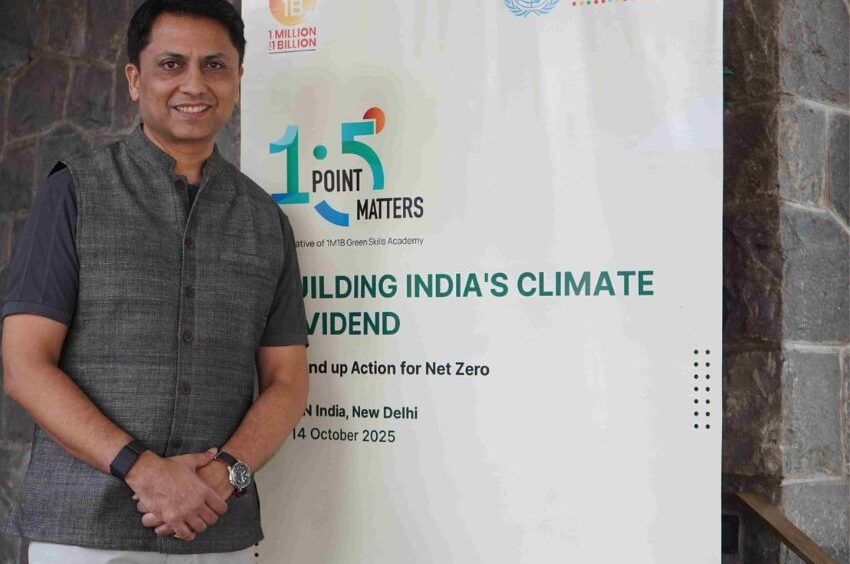Green Jobs Can Drive Reverse Migration: 1M1B Founder On Building Rural Climate Economies

1M1B’s Green Skills push aims to turn reverse migration into a driver of rural resilience and climate-ready growth
As India navigates the twin challenges of urbanisation and climate change, a new rural narrative is emerging — one that places green jobs and clean technologies at the heart of economic renewal. For the 1M1B (One Million for One Billion) Founder, it’s time to shift the focus from migration to reverse migration by creating livelihood opportunities rooted in sustainability and local innovation.
“Let’s give jobs where people live,” the 1M1B Founder Manav Subodh said. “In the green job sector, leveraging technology, there is a big possibility for people to stay and thrive in their hometowns.”
In 2019, 1M1B collaborated with CBSE and IBM to co-develop the AI for Better India curriculum, designed to ensure that artificial intelligence becomes a tool for inclusion rather than exclusion.
“AI should not create exclusion like the internet did in the 1980s and 1990s,” he said. “Our goal was that even a student in a tier-3 town could use AI to impact their community.”
The curriculum, now implemented in over 604 schools and reaching 30,000 students, has helped shape a generation of socially aware innovators.
From AI to Climate Action: Green Skills Academy
After a decade of work in education and youth empowerment, 1M1B is now turning its focus to climate action and green skilling. Its new initiative — the 1M1B Green Skills Academy , launched in partnership with Chandrababu Naidu — is based in Kuppam, Andhra Pradesh, far from India’s metros by design.
“We could have built it in Bengaluru or Delhi, but the grassroots need world-class training more,” he said. “People closer to forests, rivers, and mountains are our frontline climate warriors. Unless we enable them, we can’t accelerate climate action.”
The academy offers training in sustainability-linked sectors such as renewable energy, EV maintenance, waste management, and green hydrogen — with a 70 per cent job placement rate so far.
Job fairs (rozgar melas) are being held in partnership with industry to ensure trainees move directly into employment, bridging the long-standing gap between vocational education and job outcomes.
Rethinking Green Jobs Beyond Agriculture
The 1M1B Founder is clear that green skills are not limited to farming. “Everybody thinks green means sustainable agriculture — but that’s just one part,” he explained. “We need green-skilled people in engineering, hospitality, packaging, logistics, and across sectors. Every industry must embed sustainability.”
This broader framing has also guided 1M1B’s ‘1.5 Matters’, which seeks to align India’s youth awareness with the Paris Agreement’s 1.5°C global temperature goal. The campaign integrates sustainability education into high schools and municipal partnerships – from Hyderabad’s GHMC to the Rajahmundry Municipal Corporation — to nurture a sustainability mindset among India’s 371 million young citizens.
The Reverse Migration Opportunity
The Founder believes India now stands at a turning point where reverse migration — once seen as a symptom of distress — could become an opportunity for regional resilience.
“Earlier everyone said there’s no way to stop migration. But in the green job sector, leveraging technology, we can. People are already leaving Delhi and Bengaluru for cleaner air. Let’s make sure they find work and purpose in their hometowns.”
Through decentralised clean energy, rural skill centres, and climate entrepreneurship, he envisions rural areas becoming engines of sustainable growth. Women and youth, he added, can play a key role through biomass enterprises, EV maintenance, and decentralised renewable energy.
While acknowledging concerns about AI’s energy footprint, the Founder insists the solution lies in responsible deployment, not avoidance.
“You can’t stop AI, just like you couldn’t stop the internet,” he said. “The challenge is to use it responsibly — Japan uses AI to improve solar efficiency, Norway for ocean monitoring. In India too, AI can help reach sustainability goals faster.”
To this end, 1M1B trains young professionals in tools like OpenLCA and Power BI for monitoring energy and water usage — vital for sustainability management in corporates and institutions aiming for net-zero operations.
Bridging the Skill Gap
The Founder is vocal about India’s technical training gap. Many Industrial Training Institutes (ITIs), he noted, lack faculty and equipment to provide hands-on experience in renewable energy systems.
“Solar training without real equipment doesn’t work. We’re working with ITIs and corporates to fix that. Revamping ITIs for green jobs is as crucial today as the computer revolution was in the 1990s.”
He added that inadequate training and low placement confidence discourage youth from joining green sectors — something 1M1B aims to change through assured job linkages and corporate partnerships.
The Founder also called for a shift in CSR funding priorities from urban visibility projects to grassroots infrastructure.
“CSR needs to pivot – it’s still stuck in the cities,” he said. “If companies channel CSR towards upgrading ITIs, setting up skill academies, or funding rural climate initiatives, we can unlock both jobs and impact.”
He believes this shift can turn climate action from philanthropy into economic development, framing sustainability as a generator of growth, not a cost.Expanding its rural reach, 1M1B is also part of Uttar Pradesh’s AI Pragya Programme, which explores AI applications for farmers — from pesticide and rainfall management to soil health.
“If farmers are given AI tools on their phones, they can make data-driven decisions,” he said. “That’s how you make AI inclusive – by putting it in the hands of people who need it most.”
A New Rural Climate Economy
In the Founder’s view, India’s climate and livelihood goals must converge at the grassroots. The country’s two-thirds youth population, he says, holds the key to ensuring that sustainability becomes an economic driver rather than an elite concern.
“Reverse migration should not mean people returning because cities failed them,” he concluded. “It should mean they’re returning because their villages now offer opportunity, climate security, and a sense of ownership in the green economy.”
With 1M1B’s climate skilling, rural training, and awareness programmes, that future — of a decentralised, sustainable, and resilient rural India – may already be taking shape.













































































































































































































































































































































































































































































































































































































































































































































































































































































































































































































































